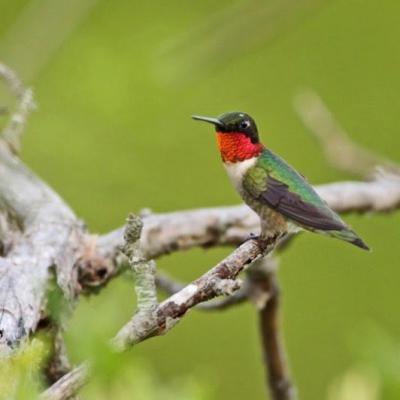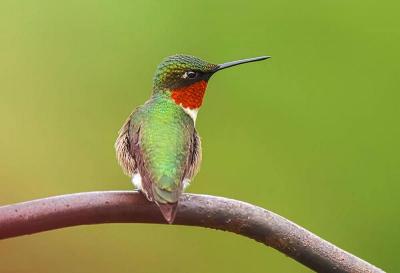Marion gardener awaits the arrival of her avian ‘fairies,’ hummingbirds
MARION — In Liz Hatch’s garden, it’s not just the lovely plants but the 30 to 50 hummingbirds buzzing overhead that set the garden apart.
“I can’t remember exactly when I became enthralled by these miracles of nature, but it has been several years of utter infatuation for me. It began with one feeder and a handful of hummingbirds, but when the fighting over the feeder started, I put up a second feeder and then a third. Currently, I have a total of six feeders,” Hatch wrote.
She credits Geoffrey Grainger, an avid Marion birder, with having introduced her to the small birds, which measure 3.5 inches and weigh an eighth of an ounce.
Ruby throated hummingbirds winter in Central America, Mexico and Florida before doubling their weight and returning here to breed. They fly over the Gulf of Mexico, where there is no place to land.
“It seems especially poignant and uplifting this year,” Hatch wrote, “I often think of what these little lives have had to endure to arrive back here at my feeders; storms, predators, lack of food sources, and all that mother nature can throw at them. In some way, they seem to help put our current circumstances into perspective.”
Hatch may not have to traverse the Gulf of Mexico, but she does put in a lot of work for the hummingbirds. She makes a sugar-water solution to fill feeders every day, regularly puts feeders through the dishwasher to reduce bacteria, and cleans them at least every other day.
“Filling six feeders and keeping them clean is a full-time summer job!” she wrote, but added “it is a labor of love that I anticipate every spring and mourn with their departure in the fall.”
In return, the birds “zip and buzz over our heads from nest to feeders incessantly,” with wings beating as many as 40 to 80 times per second, and top flying speeds of 50 miles per hour to escape predators.
Though Hatch goes to great lengths to care for hummingbirds, humans may also inadvertently be their biggest threat, as it is easy to knock down their camouflaged nests, with two tiny tictac sized eggs, while trimming shrubs. Hatch advises anyone who accidentally knocks down a nest to leave it as close to its original location as possible.
“The mother will search for days for a missing nest,” she wrote, adding, “If you can ask landscapers to prune limbs in late fall once they have migrated, it may save these little lives.”
Hummingbirds aren’t here yet, but for Hatch, their arrival will give her a sense of purpose and brighten her quarantined days.
“While confined and quarantined, shrouded with an onslaught of depressing news and negativity, I am uplifted with great anticipation and excitement, tracking the migration for the arrival of my precious, darling fairies!” she wrote.

















